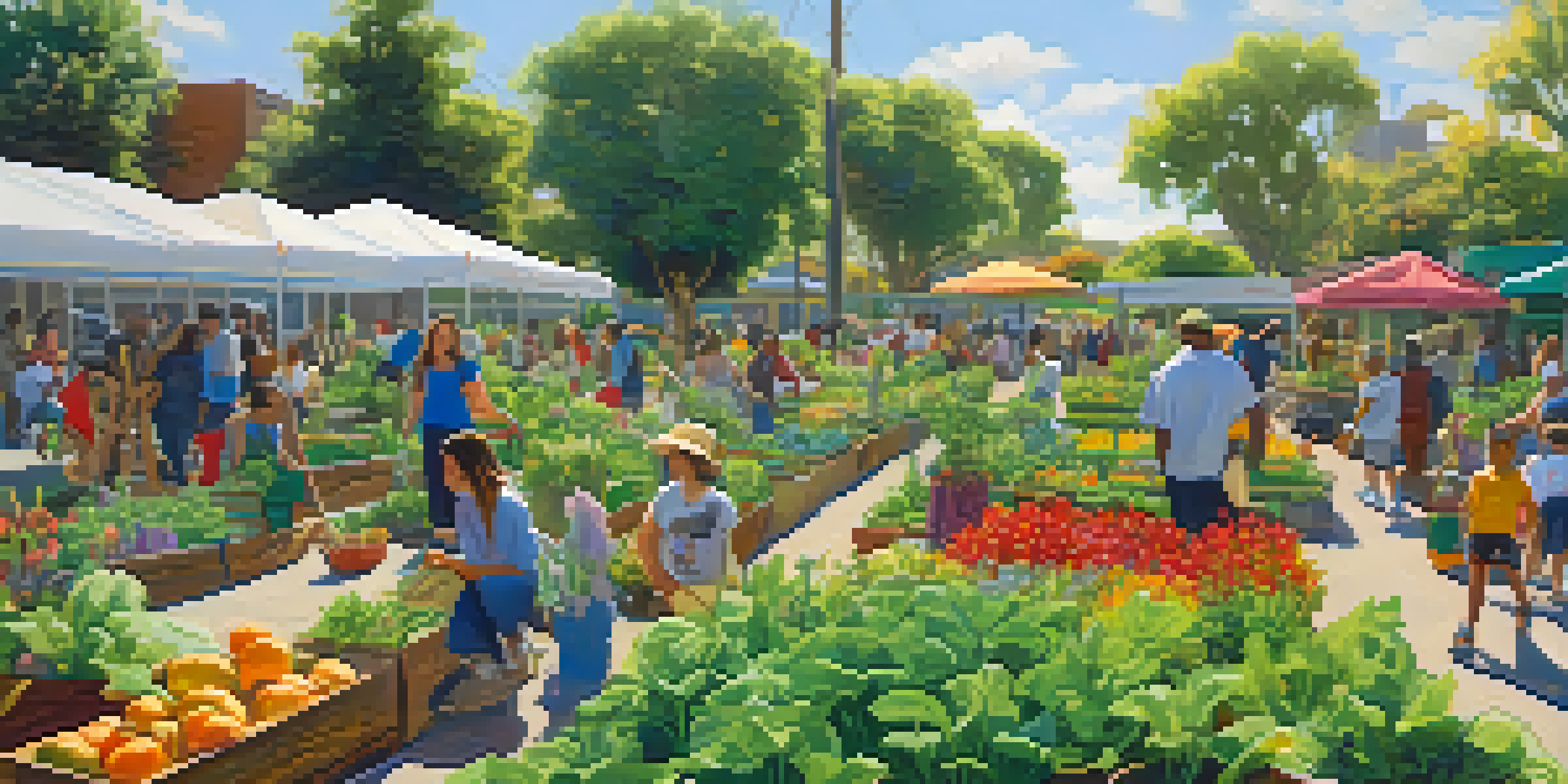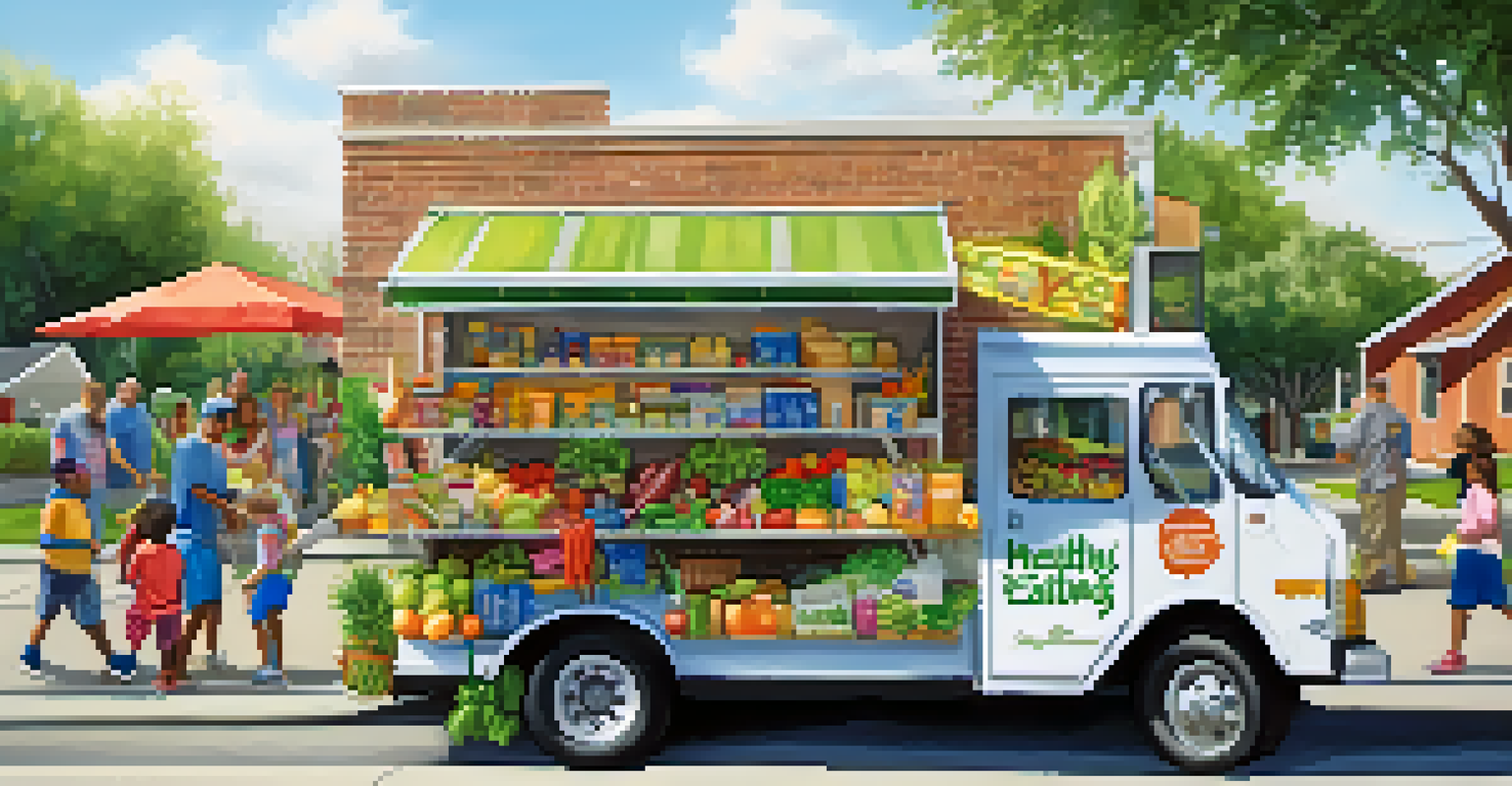Nonprofits Tackling Food Insecurity in Los Angeles

Understanding Food Insecurity in Los Angeles
Food insecurity is a pressing issue in Los Angeles, affecting millions of residents. It refers to the lack of reliable access to sufficient food due to financial constraints. Many families struggle to put meals on the table, leading to adverse health outcomes and reduced quality of life.
Food insecurity is not just about hunger; it's about the lack of access to nutritious food that leads to health disparities and diminished quality of life.
In a city known for its wealth and abundance, the stark contrast of food deserts and food scarcity is alarming. Neighborhoods with limited access to grocery stores often rely on fast food and convenience stores, which offer less nutritious options. This situation exacerbates health disparities, particularly among low-income communities.
Addressing food insecurity in LA requires a multifaceted approach, combining community efforts, government support, and nonprofit initiatives. Understanding the depth of the issue is the first step toward creating effective solutions that can improve the lives of those affected.
The Role of Nonprofits in Providing Relief
Nonprofits play a crucial role in combating food insecurity by providing immediate relief through food distribution programs. Organizations like the Los Angeles Regional Food Bank collect and distribute millions of pounds of food each year to those in need. These efforts not only address hunger but also help reduce food waste, benefiting the environment.

Beyond food distribution, many nonprofits offer additional services, such as nutrition education and cooking classes. This holistic approach empowers individuals and families to make healthier food choices, ensuring that they not only have access to food but also know how to prepare nutritious meals. For example, programs that teach families how to cook with fresh produce can make a lasting impact on their diets.
Food Insecurity Affects Many Angelenos
Millions in Los Angeles face food insecurity, struggling to access sufficient and nutritious food due to financial constraints.
The collaborative nature of nonprofits allows them to work closely with local communities, identifying specific needs and tailoring their programs accordingly. By engaging with residents, these organizations ensure that their services are both effective and culturally relevant, making a significant difference in the fight against food insecurity.
Innovative Approaches to Food Distribution
In recent years, nonprofits have adopted innovative approaches to enhance food distribution. For instance, mobile food pantries have emerged as a practical solution to reach underserved areas. These trucks travel to neighborhoods with limited access to grocery stores, bringing fresh produce and other essentials directly to residents.
The greatness of a community is most accurately measured by the compassionate actions of its members.
Technology also plays a key role in modern food distribution efforts. Many organizations utilize apps and websites to connect those in need with available resources. This not only streamlines the process but also allows for real-time updates on food availability, making it easier for families to access help.
By thinking outside the box, nonprofits are creating more accessible and efficient food distribution systems. These innovative strategies not only address immediate hunger but also foster a sense of community, encouraging neighbors to support one another in times of need.
Community Gardens: Cultivating Change
Community gardens are blossoming across Los Angeles as a grassroots response to food insecurity. These spaces not only provide fresh fruits and vegetables but also promote community engagement and education. Residents come together to cultivate their own food, fostering a sense of ownership and pride in their contributions.
In addition to providing food, community gardens serve as educational platforms. Workshops on gardening techniques, composting, and cooking healthy meals help participants develop valuable skills. This knowledge empowers individuals to take control of their food sources, contributing to long-term food security.
Nonprofits Are Key to Relief Efforts
Nonprofits play a vital role in addressing food insecurity through food distribution, education, and advocacy for systemic change.
Moreover, these gardens often strengthen community bonds, creating a supportive network among neighbors. By working together, residents can share resources, ideas, and even their harvests, building resilience against food insecurity.
Advocacy and Policy Changes
Nonprofits are not only on the front lines of food distribution; they also play a vital role in advocacy. Many organizations work tirelessly to influence policies that address the root causes of food insecurity. This includes advocating for increased funding for food assistance programs and pressing for reforms in agricultural policies.
By raising awareness about the systemic issues contributing to food insecurity, nonprofits help shift public perception and encourage action. Campaigns that highlight personal stories of those affected can build empathy and mobilize support from the community and lawmakers alike. This advocacy is crucial for creating lasting change.
Through their efforts, nonprofits aim to create a more equitable food system that ensures everyone has access to nutritious food. By tackling the issues at both the grassroots and policy levels, they are working toward a future where food insecurity is no longer a reality for Angelenos.
Collaboration Among Organizations
Collaboration is key in the fight against food insecurity, and many nonprofits in LA are joining forces to maximize their impact. By pooling resources and sharing expertise, these organizations can reach more individuals and families in need. This collective approach allows for a more comprehensive response to the challenges of food insecurity.
For instance, partnerships between food banks, schools, and local farms create a robust network that ensures food reaches those who need it most. Programs that connect schools with local farms not only supply fresh produce but also support local agriculture and the economy. It's a win-win situation for everyone involved.
Community Engagement Drives Solutions
Community gardens and collaborative partnerships among organizations foster resilience and promote sustainable solutions to food insecurity.
These collaborative efforts foster a sense of community and shared purpose among nonprofits. By working together, they can leverage their strengths and create innovative solutions that have a lasting impact on food security in Los Angeles.
The Future of Food Security in Los Angeles
As we look to the future, the fight against food insecurity in Los Angeles is more important than ever. Nonprofits continue to adapt and evolve, responding to the changing needs of the community. With ongoing support from volunteers, donors, and local businesses, these organizations can expand their reach and effectiveness.
The integration of technology, community engagement, and advocacy will play a significant role in shaping future initiatives. By harnessing these tools, nonprofits can develop innovative strategies to address food insecurity and create sustainable solutions. Education and awareness will also be crucial in driving long-term change.

Ultimately, the commitment of nonprofits, along with the support of the community, will pave the way for a future where food insecurity is a thing of the past. Together, we can build a healthier, more resilient Los Angeles for everyone.